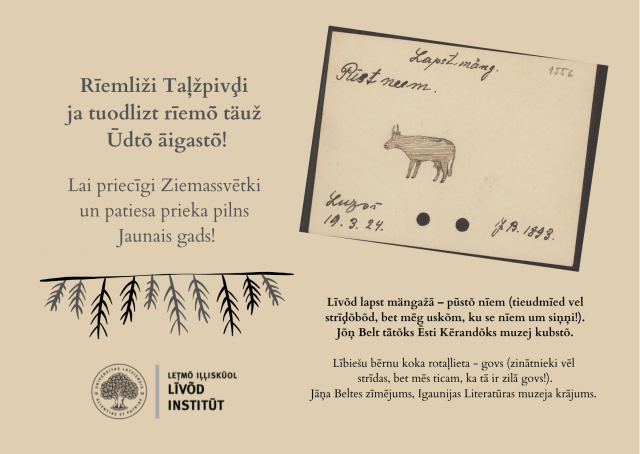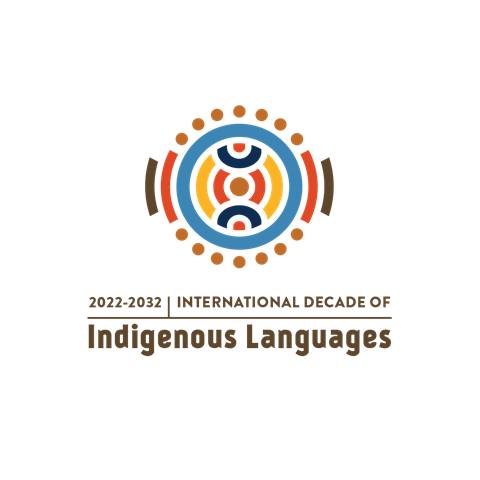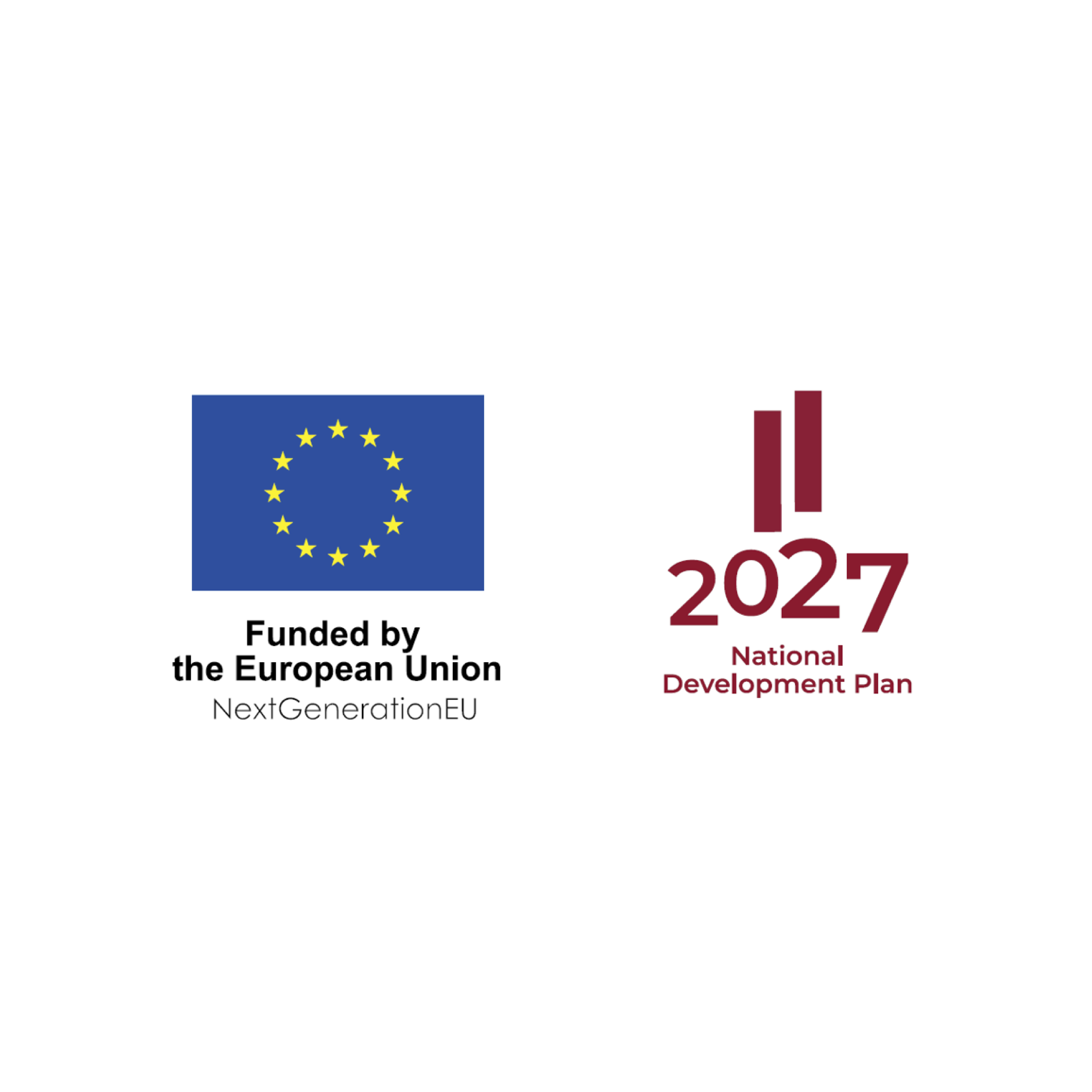November 4
Ieva Vītola, the visiting researcher of the Livonian Institute of the University of Latvia, participated in the thematic section of the International Scientific Conference “Cultural Crossroads XVI” of the Latvian Academy of Culture with a report “Preservation of the Livonian intangible cultural heritage during the pandemic”. The abstract of the report is available on page 95 of the collection of the conference theses. (in Latvian).
From October 7 to October 8
The 8th Livonian Culture Days took place last week from October 7th to 8th in Ventspils. The program included a series of various events dedicated to Livonian culture, language, history, and descendants. The goal of the Livonian Culture Days in Ventspils 2022 is to popularise Livonian intangible cultural heritage and modern culture, by giving attendees a chance to look at the past events that shaped the Livonian national consciousness, to learn about and document traditional Livonian cultural practices, to hear the sound of Livonian and experience modern Livonian culture as well as to strengthen the Livonian community’s sense of identity.
The Livonian Culture days were opened with a photo exhibit “The feathered, furry, slippery, and scaly residents of northern Kurzeme” by the author and nature photographer Vilnis Skuja. Further on participants were challenged to reflect on different aspects of Livonian identity led by Zane Ernštreite. A special atmosphere to the events was created by Ventspils Livonian ensemble “Rāndalist” and the folklore group “Kāndla”.
The second day of the Livonian Culture Days started with a moment of remembrance at the monument dedicated to Livonian poet Jānis Princis. Followed by the series of popular scientific readings entitled “Stories from the University of Latvia Livonian Institute and its friends”. The Livonian Cultures days were closed by the concert program “Līvu sasaukšanās” (“Livonian Call”) by the choir “ANIMA”.
The Livonian Culture Days in Ventspils are organised by the foundation “Ventspils Livonian Association Rānda” and the Ventspils division of the Livonian Union in cooperation with the UL Livonian Institute.
The Livonian Culture Days are financially supported by the Latvian State Culture Capital Foundation, the Kurzeme Planning Region, the Latvian National Centre for Culture, the Ventspils City Council, and Igors Skoks. The cooperation partners of the Livonian Culture Days in Ventspils are the Ventspils Main Library, SIA “Kurzemes filharmonija”, and the Ventspils Culture Centre.
From August 2 to August 6
The partners of the project “Re-voicing cultural landscapes: narratives, perspectives, and performances of marginalised intangible cultural heritage” from the University of Falmouth (United Kingdom), the University of Groningen (Netherlands) and the University of Tartu (Estonia) visited the University of Latvia Livonian Institute. The first two days were spent in intensive work sessions, presenting and discussing the findings and first conclusions of the research on the preservation, accessibility, and sustainability of the intangible cultural heritage of traditional minority cultures: Cornish, Frisian, and Livonian. During the final days of the visit, the project partners went on thematic trips to get acquainted with the manifestations of the Livonian heritage in the Northern Vidzeme region and Southern Estonia, and also visited the annual Livonian festival in Mazirbe.
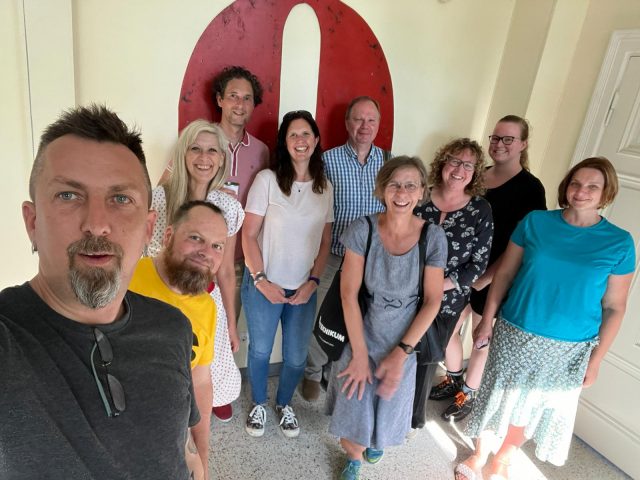
July 29
Valts Ernštreits, director of the University of Latvia Livonian Institute, and researcher Gunta Kļava met the participants of the Livonian children and youth camp – summer school “Mierlinkizt” to learn the Livonian language. On the first day of school, we tried to remember what we already know, consolidate what we have remembered, and also learn something new, both by actively writing and reading.
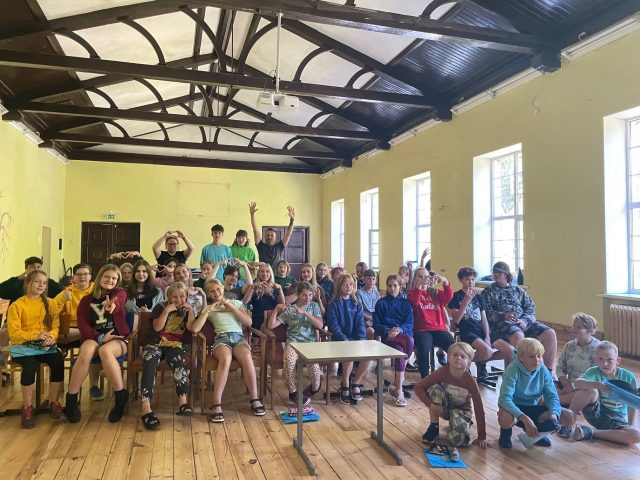
June 25
Latvian Radio Studio in Latgale interview with Uldis Balodis, a researcher at the Livonian Institute of the University of Latvia, who has been researching Lutsi’s linguistic heritage of Ludza region since 2013, about a new exhibit on the Lutsis and their linguistic and cultural heritage in the Ludza Regional History Museum.
June 21
Valts Ernstreits, Director of the Livonian Institute of the University of Latvia has become the Co-Chair of the UNESCO Preparatory Working Group for the UN Decade of Indigenous Languages 2022-2032.
June 16
The third Lutsi studies seminar – “The Lutsis and the Finnic heritage of Latgale” took place at the Ludza Regional History Museum. The seminar coincided with the opening of a new exhibit about the Lutsis and their linguistic and cultural heritage at the museum. The exhibit was created by Uldis Balodis in cooperation with specialists at the museum.
During the seminar, presentations on the Finnic languages and their origin, the ancient roots of the Lutsi language, and the history of the Lutsi community were given by the University of Helsinki professor Riho Grünthal, University of Tartu professor Karl Pajusalu, and UL Livonian Institute researcher and University of Tartu research fellow Uldis Balodis. The seminar was opened by the guest of honor — Estonian ambassador to Latvia Arti Hilpus, the head of the Ludza municipality Edgars Mekšs, Cultural Policy Advisor to the Latvian Minister of Culture and Director of the UL Livonian Institute Valts Ernštreits, and the head of the Estonian Mother Tongue Society Helle Metslang. During the event, Anne-Ly Reimaa, Head of International Relations on Integration Issues for the Estonian Ministry of Culture – awarded letters of appreciation on behalf of the Estonian Ministry of Culture to researchers as well as representatives of the Ludza municipality and community organizations in recognition of their work in researching and popularizing Lutsi linguistic and cultural heritage.
The seminar concluded with a performance of Lutsi folk songs by the folklore group “Ilža”, several members of which are Lutsi descendants. The seminar was organized with the support and encouragement of the Ludza municipality, the Ludza Regional History Museum, and the Estonian Mother Tongue Society (Emakeele Selts).
From June 2 to June 3
On 2–3 June 2022, an international conference on Minor Finnic Languages was held in Uppsala, Sweden. The purpose of this conference is to give researchers working on minor Finnic languages the opportunity to present current research, participate in formal and informal discussions on relevant topics, and explore potential opportunities for collaborative work. Three researchers of the UL Livonian Institute were also contributing with their presentations – Milda Dailidenaite, Valts Ernštreits un Gunta Kļava. Read more about the conference here.
June 1
The director of the UL Livonian Institute, Valts Ernstreits, speaks at a high-level dialogue on ICT for indigenous languages organized by UNESCO. The winners of the hackathon on the ICT for indigenous languages, which was also evaluated by the UL Livonian Institute, will also be announced as part of the event.
From May 26 to May 29
The 28th Biennial AABS Conference “Baltic Studies at a Crossroads”s (AABS) took a place at the University of Washington in Seattle between May 26th and 29th. The UL Livonian Institute was participating in a number of different sessions and events at the conference.
On May 26th at the conference’s opening plenary, Uldis Balodis was speaking about his experience with endangered language documentation and revitalization in his talk “Perspectives on Language Materials for Dormant and Endangered Language Communities in North America and Northern Europe”.
On May 27th, Valts Ernštreits was moderating a discussion about the documentary “To Save a Language / Keelepäästja”, which describes Estonian linguist Indrek Park’s experience with indigenous North American language revitalization; Milda Dailidėnaitė was giving her talk “Indirect Imperatives in the Baltic Sea Region” and Valts Ernštreits was delivering his address “Digital Resources in the Service of the Livonians – an Indigenous People of the Baltics”.
On May 28th, Valts Ernštreits and Sanita Reinsone (the Institute of Literature, Folklore and Art of the University of Latvia) were chairing the session “Digital Resources and Tools for Humanities and Social Sciences: Latvia”, the participants of which will also learn about the digital resources created by the UL Livonian Institute; Gunta Kļava was giving her talk “COVID-19 pandemic challenges for the endangered language communities: Livonian example”; Uldis Balodis and Karl Pajusalu (University of Tartu) were giving their talk “Literature and Language Development in the Dormant Languages of the Baltic countries”.
May 6
The students of Livonian along with their teacher Tuuli Tuisk and her colleagues from the University of Tartu were visiting UL Livonian Institute. It is always a great pleasure to receive good friends and truly devoted future researchers!
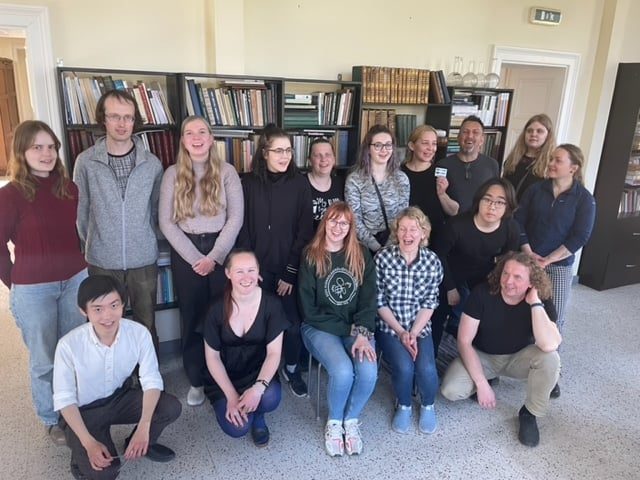
May 3
The researcher Gunta Kļava presented at the TÜling lecture series, titled “Continuity of Livonian: experience of critically endangered language”. The abstract, broader information on TÜling lecture series and details of connecting are available TÜling website.
April 27
During the visit of Latvian president Egils Levits and Mrs. Andra Levite to Ludza, the director of the Ludza Municipal Library Inta Kušnere gifted Mrs. Levite a copy of “Lutsi kiele lementar” (Lutsi language primer). The Lutsi primer was authored by UL Livonian Institute researcher Uldis Balodis. It was published in fall 2020 by the UL Livonian Institute in cooperation with the Ludza municipality and the Ludza Municipal Library. The Lutsi primer is available for free download at: http://www.tinyurl.com/ludza
April 23
Valts Ernštreits, Head of the Livonian Institute of the University of Latvia visited the Latvian Embassy in France and met the children’s folklore group “Guntiņa” and their parents. Valts Ernštreits talked about the indigenous people of Latvia – about Livonians, the interaction between the Livonian and the Latvian language, and language similarities and differences. Children enjoyed the language games, how to reveal the similarities between the Livonian, Latvian, Estonian, Lithuanian and Finnish languages, as well as learning about the formation of the Livonian place names?
April 8
On April 8th, UL Livonian Institute Senior Researcher Renāte Blumberga was awarded the 2022 Aleksandrs Pelēcis Literary Award at the Talsi Main Library for her monograph “The History of the Livonian Community House: From First Plans to its Opening”. Renāte Blumberga’s monograph was among eight books published in 2021 on the cultural and historical life of Talsi municipality that were nominated for this award. The northern Kurzeme village of Mazirbe – located in Talsi municipality – is also the location of the Livonian Community House, which was dedicated in 1939. The award was established in 2000 by the Talsi City Council in honour of the 80th anniversary of the birth of poet Aleksandrs Pelēcis (1920–1995) who was born in Vidzeme, deported to Siberia, and spent the second half of his life in Talsi. Previous recipients of this award include UL Livonian Institute researcher Baiba Šuvcāne for her books “Senais lībiešu ciems Kolka” (The Ancient Livonian Village of Kolka, 2011) and “Sauc par Vaidi mūsu ciemu” (They Call our Village, Vaide, 2016).
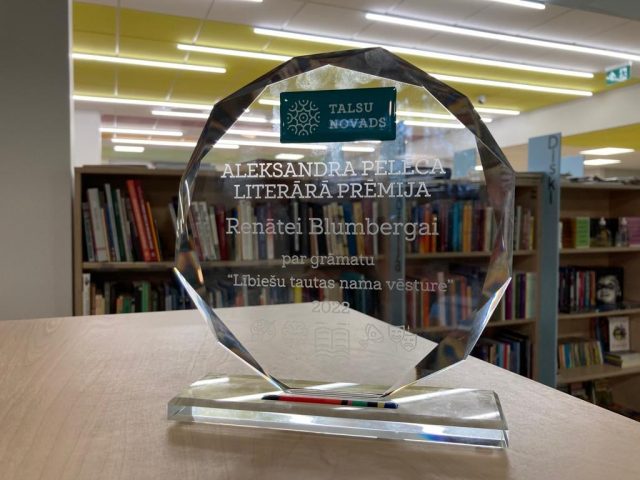
April 6
During the annual career education event “Shadow Day” for school youth, two students Jūlija Otomere from the 7th grade of Riga State German Gymnasium and Katrīna Lote Gaile from the 9th grade of Riga Imanta Secondary School shadowed the researchers of the Livonian Institute of the University of Latvia. Now we also have a name for the “Shadow day” in Livonian – Vōŗõd pǟva.
April 5
The director of the UL Livonian Institute, Livonian activist Valts Ernštreits, and researcher of the University of Turku, developer of the cultural contacts between Finland and Hungary Heino Nyyssönen have received a prize from EW Ponkala Foundation (Finland). The prize has been established in 1924 by the foundation established by the Finnish entrepreneur and patron Erkki Wilho Ponkala (1862–1943) and is rewarded for the development of cultural contact between Nations speaking Finno-Ugric languages.
March 30
In the section of the 80th International Scientific Conference of the University of Latvia “Language and Culture in the Digital Age”, four presentations of different projects implemented by the Livonian Institute of the University of Latvia were presented. Gunta Kļava gave a presentation on “Role of digital instruments in the safeguarding of endangered languages”. The presentation is available at this link. Valts Ernštreit’s presentation on “What digital technologies does the Livonian need?” is available at this link. Milda’s Dailidėnaitė’s presentation on “Livonian jussive and concession” is available here. The presentation of Lolita Ozoliņa and Ieva Vītola on “The reflections of the Livonian cultural landscape in digital space” can be viewed at this link.
March 28
Researchers Valts Ernštreits and Gunta Kļava of the Livonian Institute of the University of Latvia visited Ventspils Center Primary School and Tārgale Primary School, where they had presentations about Livonians, Livonian history, culture, and language to the senior students of both schools. Thank you for your great interest and attention to the students and teachers.
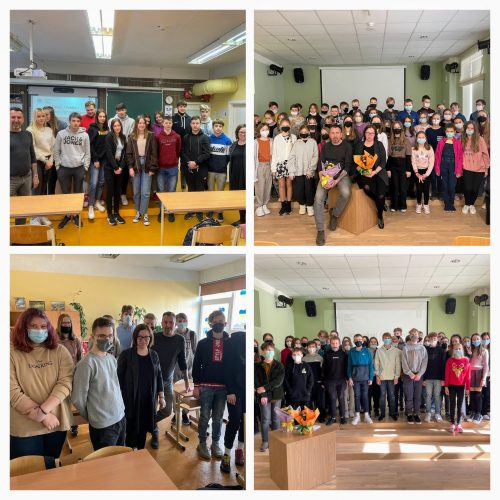
March 19
The International Decade of Indigenous Languages (2022–2032) has been opened in Latvia with the Livonian tradition of waking birds in Mazirbe by the sea. Julgī Stalte and the choir “Lōja”, its leader Ģirts Gailītis, involved the event participants in the awakening tradition by telling about the origin of the tradition. Livonians believe that migratory birds do not fly in autumn, but spend the winter at the bottom or shore of the sea, river, or lake.
Minister of Culture Nauris Puntulis, Minister of Education and Science Anita Muižniece, and the International Decade of Indigenous Languages Coordinator Irmgarda Kasinskaite-Buddeberg unveiled the Decade and participated in the event. The Livonian Institute of the University of Latvia introduced the Livonian language and culture preservation projects and the brand-new platform Livonian.tech – the digital resource for Livonia language and culture.
The wealth of mankind lies in the diversity of mankind, and only knowledge and understanding of this diversity is the basis for peaceful living together, as emphasized by Valters Ščerbinskis, the editor-in-chief of the National Encyclopedia, about the inclusion of the Livonian language in the titles of the encyclopedia.
The opening of the International Decade of Indigenous Languages (2022–2032) was organized by the Livonian Institute of the University of Latvia in cooperation with the organizations of the Livonian community and the Latvian National Commission for UNESCO. We thank you Baiba Molnika, Zane Ernštreite, Ieva Ernštreite, Janusz Kaminski, Sigita Grinpukale from “Dvjūriņa”.
The University of Latvia, whose Vice-Rector for Humanities and Social Sciences Ina Druviete was also involved in the event, and the Ministry of Education and Science supported the awakening of birds and the symbolic beginning of new works in the decade. We appreciate your support!
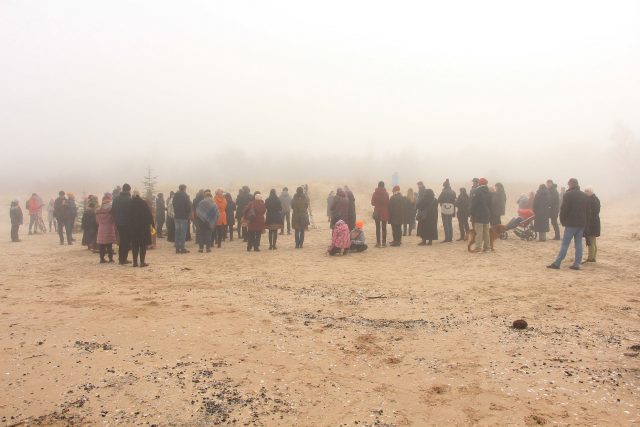
March 18
Milda Dailidėnaitė, Valts Ernštreits, and Gunta Kļava, researchers at the Livonia Institute of the University of Latvia, presented at the 6th conference “Digital Humanities in the Nordic and Baltic Countries” (March 15-18) on methods how to improve digital research tools in the Livonian language. Conference program here.
March 17
In the broadcast “Kultūras Rondo” of LR1 Head of the Livonian Institute of the University of Latvia, Valts Ernštreits talks about the United Nations (UN) Decade of Indigenous Languages (2022-2032) and the opening event, which will take place on March 19, at the Livonian Peoples House (Lībiešu Tautas namā) in Mazirbe. The ancient Livonian tradition of awaking birds annually takes place around the Easter celebration and symbolically marks the beginning of the Livonian New Year. This year’s tradition also features the beginning of the UN-proclaimed Decade of Indigenous Languages.
March 10
In the latest issue of the scientific journal “Linguistica Lettica” of the Institute of the Latvian Language of the University of Latvia, Mildas Dailidėnaitė’s article “Productivity of Latvian Prefixes in Word Formation and Stability of Derived Verbs” was published. The electronic edition of the journal issue can be read in the open access repository of the University of Latvia.
March 5
Today indigenous people of Latvia, Livonians, and the UL Livonian Institute are standing together with the rest of the people of Latvia protesting the war. Russia trying to defeat and enslave the people of Ukraine is a threat not only to its neighbors but to all nations and peoples around the world, including those living in Russia itself. Today in the name of Russia people are being sent to fight and to die in another country. Ukrainians are fighting not only for their own freedom but for the freedom of all peoples in the world. Long live Ukraine!

February 18
On the eve of Estonia’s Independence Day, Ambassador Arti Hilpus presented a letter of thanks from the Estonian Ministry of Foreign Affairs to Valts Ernštreits, Director of UL Livonian Institute, for his long-term work on preserving the Livonian language and culture and promoting Finno-Ugric cooperation between Estonia and Latvia. The letter of thanks from the Estonian Ministry of Foreign Affairs is presented to state diplomats and associations for their significant contribution to the promotion of the Estonian language and culture throughout the world. Estonia’s Independence Day is celebrated on February 24.
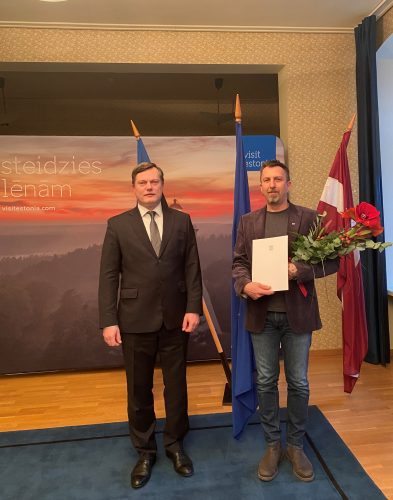
February 17
Thanks to a donation by Livonian cultural researcher and activist Zoja Sīle, the UL Livonian Institute’s collection now includes the correspondence of former Livonian Union chairman Maŗt Lepste from the period between 1925 and 1931. This correspondence includes many letters from some of the most important Livonian cultural researchers, activists, and supporters. Many of the letters found in this collection are also written in Livonian. This collection is a valuable source for research into the Livonian language and history.
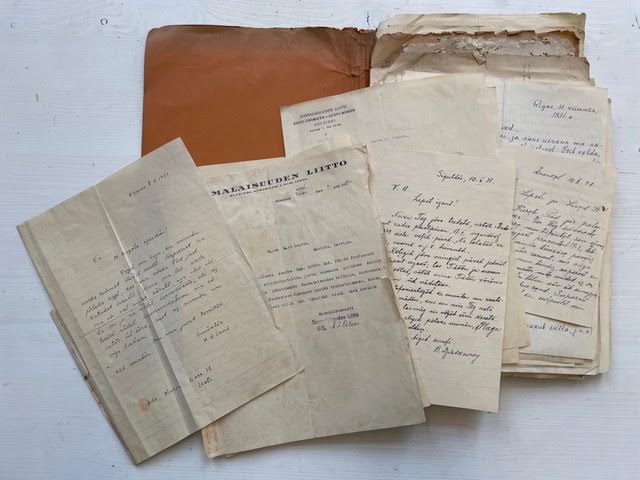
January 24
At the initiative of the University of Liepaja, UL Livonian Institute taught the course “Introduction to the Livonian Culture and Language” to the students of the study program “Cultural Management”. The course was developed at the “Livonian Summer University” jointly organized by UL Livonian Institute and the University of Tartu and is intended for acquiring basic knowledge of Livonian history, culture, and language for future researchers. The week-long and intensive lecture course ended on January 24 with presentations by the 2nd year students of the study program “Cultural Management”, in which students revealed their ideas for popularizing and reviving the Livonian intangible cultural heritage.
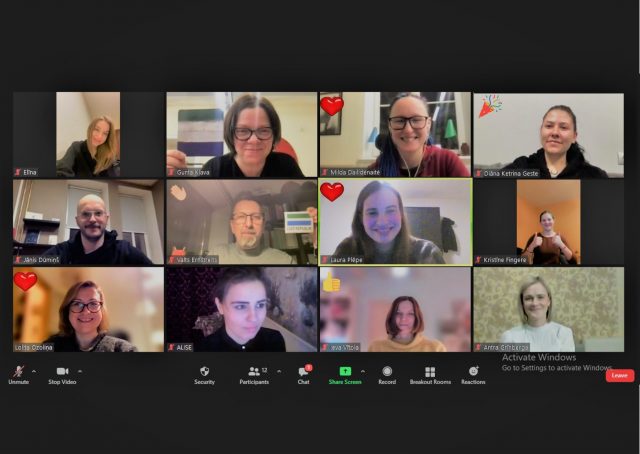
January 11
UL Livonian institute senior researcher Renāte Blumberga visited the Embassy of the Republic of Hungary in Rīga on the invitation of Ferenc Bányai, Hungarian Ambassador Extraordinary and Plenipotentiary to Latvia. The subject of this meeting was the Livonian Community House in Irē (Mazirbe) and the contribution of the Hungarian government to its construction. The ambassador and the Hungarian cultural attaché Annamária Bányai-Balázs wished to acquaint Renāte Blumberga – author of the book “Lībiešu tautas nama vēsture” (The History of the Livonian Community House) – with document copies from the National Archives of Hungary, describing the support given by Hungary to Livonian culture in the 1920s and 1930s. These documents were found by Cultural Attaché Annamária Bányai-Balázs in the archives last summer. As these documents were not available to the author while she was writing her book, she plans to write an article in the future based on them describing the history of Hungary’s support for the Livonians. Renāte Blumberga expressed her gratitude for the documents and the invitation to visit the embassy by giving the embassy a copy of her 2021 monograph on the Livonian Community House.
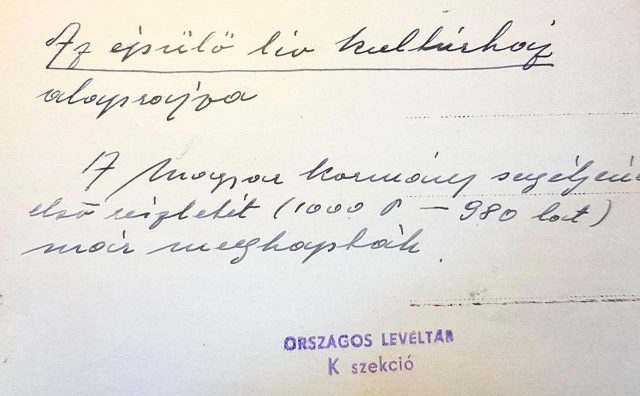
January 4
In the broadcast “Kultūras Rondo” of LR1 the Head of the Livonian Institute of the University of Latvia talks about the intention to create a multifunctional Livonian language dictionary
Valts Ernštreits, Head of the University of Latvia Livonian Institute talks about the intention to create a multifunctional Livonian language dictionary on the Latvijas Radio1 programme “Kultūras Rondo”. The dictionary will be supplemented with an audio pronunciation, English equivalents terms as a part of the State Research Programme “Letonica for the development of Latvian and European Society”. The data generated by this dictionary will also be used to create automated spelling tools, automatic translation and voice synthesis tools for the Livonian language. Also a post on the UL Livonian Institute Facebook page.
January 1
University of Latvia Livonian Institute a truly joyful New Year!
